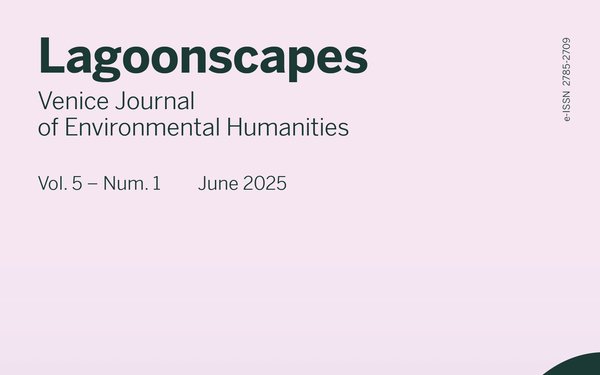News
Loading ...
Oct. 29, 2025
5th Network Meeting of Environmental History
On Friday, October 31 2025, the 5th Network Meeting of Environmental History will take place from 12 to 2 p.m. in room 201 of the Alte Universität (Eichleitnerstr. 30). In this context, Dr. L. Sasha Gora will give a keynote speech on the topic "Cod, Cabot, and the History of Salt."
Read more

Sept. 26, 2025
Article on “Walking as a Method” published on the website “Hypotheses - Academic Blogs”
“Get off campus” – Walking as a method in historical studies is the title of the article published on Hypotheses, the platform for academic blogs. In it, Prof. Müller describes, among other things, her experiences during the summer semester of 2025 with the students of the advanced seminar “Forest Spirits” on an excursion to the Fugger Forest.
Read more
July 22, 2025
Publication of the special issue of the Lagoonscapes magazine: “Cracking the Surface”
The latest issue of Lagoonscapes (Venice Journal of Environmental Humanities): “Cracking the Surface” was created under the collaboration of Prof. Simone M. Müller and Livia Cahn (Ludwig-Maximilians-University Munich).

June 4, 2025
Prof. Dr. Simone M. Müller is a finalist for the Fleck Prize 2025
With her book “The Toxic Ship: The Voyage of the Khian Sea and the Global Waste Trade”, Prof. Dr. Simone M. Müller made it to the final of the Fleck Prize 2025.
Read more
May 6, 2025
4th Network Meeting of Environmental History
On Friday, May 9, 2025, the 4th Network Meeting of Environmental History will take place from 12 to 2 p.m. in seminar room 201 of the Alte Universität (Eichleitnerstr. 30). In this context, Dr. Lisa Kolb will give a keynote speech on the topic "Salpeter - ein kritischer Rohstoff im Dreißigjährigen Krieg".
Read more

March 25, 2025
The University of Toronto Press publishes 'Culinary Claims'
Dr. L. Sasha Gora, the director of the "Off the Menu" Research Group, has published her first monograph, 'Culinary Claims: Indigenous Restaurant Politics in Canada', as part of the Culinaria series at the Toronto University Press. It explores the complex relationships between wild plants and introduced animals, between Indigenous foodways and Canadian regulations.

March 21, 2025
The book The Toxic Ship wins two research awards
The book "The Toxic Ship – The Voyage of the Khian Sea and the Global Waste Trade" by Simone Müller, University of Augsburg, has been awarded two international academic prizes. These are the Harold & Margaret Sprout Award of the International Studies Association (ISA) and the Hagley Prize awarded by the Business History Conference (BHC) and the Hagley Museum and Library.
Read more

March 3, 2025
“Wetlands in History” receives support from SEED funding from the University of Augsburg
The working group “Wetlands in History: Histories from the quaking zone, 1630-1997” receives support from SEED funding from the University of Augsburg and can thus continue and expand its work.
Read more
Feb. 27, 2025
Poem from Anne-Sophie Balzer about the Schneefernerhaus published at webpage from Elitenetzwerk Bayern
Here you can find the author's personal impressions of the Schneefernerhaus: "In the context of the master's seminar “Is Winter still Coming?”, I had the opportunity to talk about glacier poetry with the students on site and then stay a little longer on my own. The poem was written during a two-day stay in January 2025."
Read more
Feb. 25, 2025
Prof. Dr. Simone Müller receives the Harold & Margaret Sprout Award of the International Studies Association for “The Toxic Ship”
The Toxic Ship by environmental historian Simone Müller receives the Harold & Margaret Sprout Award. Since 1972, the award has been given annually to the best book in the field of international environmental problems -- a book that contributes to theory and interdisciplinarity, demonstrates accuracy and coherence in research and writing, and offers accessibility and practical relevance.
Read more
Jan. 22, 2025
Research from Augsburg in „The Guardian”
The USA is increasingly shipping toxic waste to Mexico.
The British newspaper The Guardian quoted Simone M. Müller in one of its most recent articles. It sums up the problem the USA causes by shipping off their toxic waste to Mexico – “out of sight, out of mind” like Simone M. Müller accurately describes it.
Dec. 10, 2024
New book "Ecological Ambivalence, Complexity, and Change" has been published
Simone M. Müller, Matthias Schmidt and Kirsten Twelbeck have published a new book together. Many scientists have come together to offer a systematic, interdisciplinary analysis of today's ecological changes.
Read more

